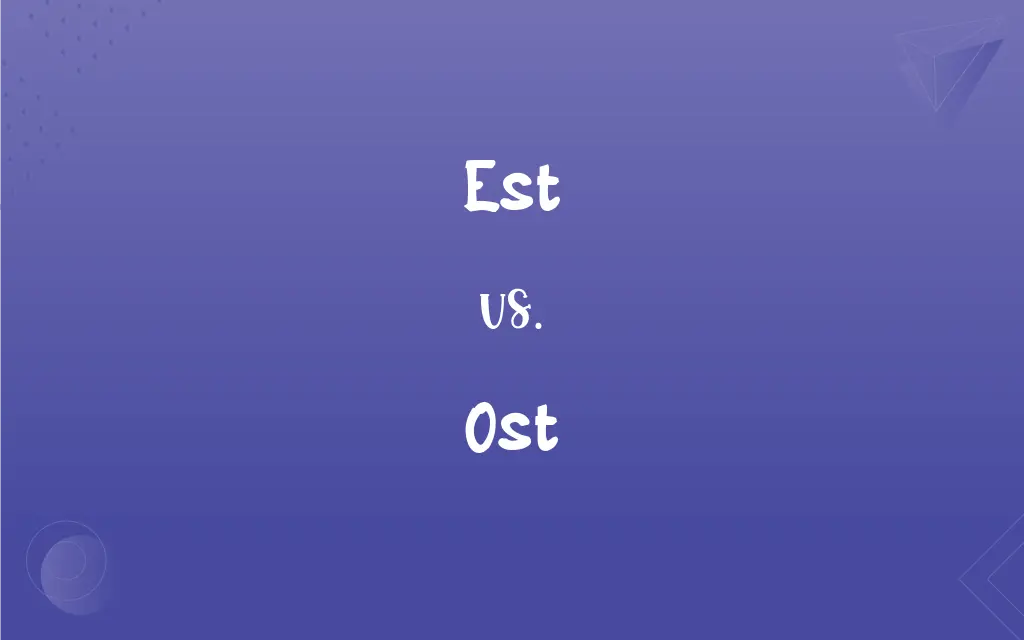Est vs. Ost: What's the Difference?
By Harlon Moss & Aimie Carlson || Updated on May 23, 2024
"Est" is French for "east," often used in geographical contexts, while "Ost" is the German word for "east," similarly used in geographical descriptions.

Key Differences
"Est" is a term used in French to denote the cardinal direction east. It appears frequently in geographic and navigational contexts, such as maps and travel guides. French speakers use "Est" to refer to regions or places located in the eastern part of a country or continent. "Ost" is the German equivalent of "east" and serves the same purpose in the German language. It is commonly found in German maps, signs, and literature when indicating eastern directions or regions. German speakers refer to "Ost" to describe areas situated in the east.
In terms of language usage, "Est" belongs to the Romance language family, being a part of French, which evolved from Latin. The term is pronounced with a silent 't' and sounds like "ehst." French geographical terms often include "Est" to specify eastern locations. "Ost," on the other hand, comes from the Germanic language family and is a core part of the German language. It is pronounced as "ohst," with a distinct 't' sound at the end. German directional terms frequently use "Ost" to indicate an eastern direction.
Both "Est" and "Ost" are integral to their respective languages, aiding in navigation and geographic orientation. They serve similar purposes but are distinct in pronunciation and linguistic roots.
In cultural contexts, "Est" might be used in French literature and dialogues to describe eastern settings or origins. Similarly, "Ost" appears in German writings and conversations to refer to the east.
Comparison Chart
Language Family
Romance
Germanic
ADVERTISEMENT
Pronunciation
"ehst" (silent 't')
"ohst" (pronounced 't')
Usage
Geographical, navigational
Geographical, navigational
Cultural Context
French literature, dialogues
German writings, conversations
Derived From
Latin
Old High German
Est and Ost Definitions
Est
Common in geographic descriptions.
La ville se trouve à l'est.
ADVERTISEMENT
Ost
Indicates the eastern direction.
Berlin liegt im Osten Deutschlands.
Est
Used to indicate the eastern direction.
Paris est à l'est de la France.
Ost
Describes eastern regions.
Der Osten Europas ist kulturell reich.
Est
French term for east.
Le soleil se lève à l'est.
Ost
German word for east.
Die Sonne geht im Osten auf.
Est
Refers to eastern regions.
L'est de l'Europe est diversifié.
Ost
Used in navigational contexts.
Das Büro befindet sich im Osten der Stadt.
Est
Appears in travel guides.
L'hôtel est situé à l'est de la ville.
Ost
Common in geographical terms.
Das Dorf liegt im Osten.
Est
(obsolete) Grace; favour.
Ost
Alternative form of oast
Est
Abbreviation of established
Ost
See Oast.
Est
Init of w:Erhard Seminars Training, a course intended to promote satisfaction with life in the present moment, as opposed to strivings to attain it.
Est
East.
Est
Standard time in the 5th time zone west of Greenwich, reckoned at the 75th meridian; used in the eastern United States
FAQs
How is "Ost" used in German?
"Ost" is used to denote "east" in German.
Does "Ost" have a distinct 't' sound?
Yes, "Ost" is pronounced with a clear 't' sound.
What does "Est" mean in French?
"Est" means "east" in French.
Is "Est" pronounced with a silent 't'?
Yes, "Est" is pronounced as "ehst" with a silent 't'.
What language family does "Ost" come from?
"Ost" comes from the Germanic language family.
What language family does "Est" come from?
"Est" comes from the Romance language family.
Can "Est" refer to regions?
Yes, "Est" can refer to eastern regions.
How would you use "Ost" in a sentence?
E.g., "Der Osten Deutschlands ist malerisch."
Which languages do "Est" and "Ost" belong to?
"Est" is French, and "Ost" is German.
Is "Ost" derived from Old High German?
Yes, "Ost" is derived from Old High German.
Are "Est" and "Ost" used in similar contexts?
Yes, both are used in geographical and navigational contexts.
How would you use "Est" in a sentence?
E.g., "L'est de la France est magnifique."
Is "Est" derived from Latin?
Yes, "Est" is derived from Latin.
Are "Est" and "Ost" culturally significant?
Yes, both terms have cultural significance in their respective languages.
Can "Ost" refer to regions?
Yes, "Ost" can refer to eastern regions.
Is "Est" used in French travel guides?
Yes, "Est" is commonly used in French travel guides.
Can "Est" and "Ost" appear in literature?
Yes, both terms can appear in literature to describe eastern settings.
Do "Est" and "Ost" aid in geographic orientation?
Yes, both terms help with geographic orientation.
Is "Ost" used in German maps?
Yes, "Ost" is frequently used in German maps.
How does pronunciation differ between "Est" and "Ost"?
"Est" is "ehst" with a silent 't', while "Ost" is "ohst" with a pronounced 't'.
About Author
Written by
Harlon MossHarlon is a seasoned quality moderator and accomplished content writer for Difference Wiki. An alumnus of the prestigious University of California, he earned his degree in Computer Science. Leveraging his academic background, Harlon brings a meticulous and informed perspective to his work, ensuring content accuracy and excellence.
Co-written by
Aimie CarlsonAimie Carlson, holding a master's degree in English literature, is a fervent English language enthusiast. She lends her writing talents to Difference Wiki, a prominent website that specializes in comparisons, offering readers insightful analyses that both captivate and inform.































































